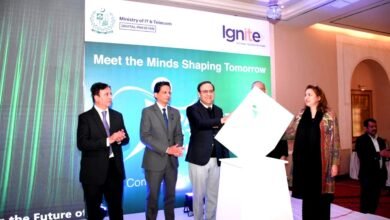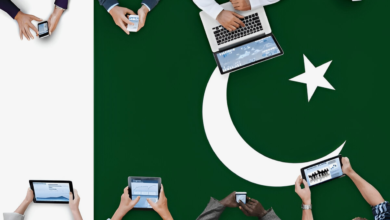Smart Cities and ICT Infrastructure in Pakistan
Smart Cities in Pakistan are transforming urban living with advanced ICT infrastructure, IoT solutions, and digital governance for development

The concept of Smart Cities and ICT Infrastructure in Pakistan is gaining momentum as the country strives to integrate technology into urban development. With rapid urbanization, increasing population density, and growing demands for efficient public services, Pakistan is exploring smart solutions to enhance livability, sustainability, and economic growth. Information and Communication Technology (ICT) plays a pivotal role in this transformation, enabling data-driven governance, improved ICT Infrastructure, and better resource management. While challenges such as funding, digital literacy, and policy implementation persist, initiatives like the Digital Pakistan Vision and collaborations with global tech leaders indicate a promising shift toward smarter urban ecosystems.
As Pakistan moves toward digitization, the development of smart cities powered by robust ICT infrastructure could revolutionize urban living. By leveraging IoT (Internet of Things), AI (Artificial Intelligence), and big data analytics, cities like Lahore, Karachi, and Islamabad are gradually adopting intelligent systems for traffic management, energy efficiency, and e-governance. However, achieving true smart city status requires coordinated efforts between government bodies, private investors, and citizens. This article explores the current state, opportunities, and challenges of smart cities and ICT infrastructure in Pakistan, providing insights into how the nation can harness technology for a sustainable future.
Smart Cities and ICT Infrastructure in Pakistan
The Current State of Smart Cities
Pakistan’s urban centers are expanding at an unprecedented rate, with nearly 40% of the population residing in cities. This rapid urbanization has strained existing ICT Infrastructure, leading to traffic congestion, energy shortages, and inadequate public services. To address these challenges, the government has begun integrating ICT into urban planning. Projects like Safe City Lahore and Karachi’s Intelligent Transport System (ITS) demonstrate early steps toward smart urbanization.
ICT Infrastructure in Pakistan
Despite these advancements, Pakistan’s smart city ecosystem remains in its infancy compared to global counterparts like Singapore or Dubai. Limited funding, inconsistent policies, and a lack of technical expertise hinder large-scale implementation. However, the Digital Pakistan Policy 2021 aims to bridge this gap by promoting 5G networks, fiber-optic connectivity, and e-governance platforms. Additionally, partnerships with Chinese firms under the China-Pakistan Economic Corridor (CPEC) have introduced.
Digital Governance
E-governance is a cornerstone of smart cities, ensuring transparency and efficiency in public service delivery. Pakistan’s E-Government Strategy focuses on digitizing land records, tax collection, and citizen identification through platforms like NADRA’s (National Database and Registration Authority) digital services. Mobile apps such as Punjab’s Qeemat Check (for commodity pricing) and Karachi’s Water and Sewerage Board’s online billing system reflect progress in this domain.
E-Services
E-Services in Pakistan are transforming governance and public service delivery through digital platforms, improving efficiency and accessibility for citizens. Initiatives like NADRA’s online portals, E-Challan systems, and Punjab’s Qeemat Check app enable citizens to access essential services remotely. The Digital Pakistan Vision aims to expand e-governance, including digital land records, tax filing, and utility bill payments.
Intelligent Transportation Systems (ITS)
Traffic congestion costs Pakistan’s economy billions annually. Smart transportation solutions, including real-time traffic monitoring, GPS-enabled public transport, and automated toll plazas, are being tested in major cities. The Lahore Metro Bus System and Islamabad’s Safe City Project utilize AI-powered cameras to manage traffic flow and reduce accidents.
Sustainable Energy
Energy shortages remain a critical issue. Smart grids and renewable energy projects, such as Quaid-e-Azam Solar Park, aim to optimize electricity distribution. IoT-enabled meters and demand-response systems help reduce wastage and improve load management.
Smart Grids
Smart Grids represent an advanced electricity distribution system that integrates digital technology, IoT sensors, and two-way communication to optimize energy efficiency and reliability. Unlike traditional grids, smart grids enable real-time monitoring, automated fault detection, and dynamic load balancing to reduce power outages and energy wastage.
Case Studies
Leading in smart initiatives with Safe City cameras, e-challans, and solar-powered streetlights. Implementing smart traffic signals and waste management systems but struggles with ICT Infrastructure decay. Focused on e-governance and green energy projects, including electric vehicle (EV) charging stations.
IoT and Big Data for Urban Management
Smart cities thrive on data. IoT sensors monitor air quality, waste management, and water supply, enabling predictive analytics for better decision-making. Karachi’s pilot smart waste management system uses sensors to optimize garbage collection routes, reducing operational costs.
Challenges in Implementation
While the potential is immense, Pakistan faces hurdles such as cybersecurity threats, lack of funding, and low digital literacy. Additionally, bureaucratic delays and political instability slow down ICT projects. Public-private partnerships (PPPs) and foreign investments are crucial to overcoming these barriers.
The Role of 5G
High-speed internet is the backbone of smart cities. Pakistan’s 5G rollout plan (expected by 2025) promises ultra-fast connectivity, enabling seamless IoT integration. Companies like Jazz, Zong, and PTCL are expanding fiber-optic networks, while the Universal Service Fund (USF) ensures rural connectivity.
Broadband Penetration
Broadband Penetration refers to the extent of high-speed internet access within a population, playing a crucial role in economic growth, education, and digital inclusion. In Pakistan, broadband adoption has surged due to expanded 4G/LTE coverage, fiber-optic rollouts, and affordable data plans by telecom providers like Jazz, Zong, and PTCL.
Future Prospects
To accelerate smart city development, Pakistan must: Increase ICT Infrastructure funding and encourage private sector participation. Enhance digital literacy through nationwide training programs. Strengthen cybersecurity laws to protect citizen data. Foster international collaborations for knowledge transfer.
Recommendations
The government must prioritize policy reforms to streamline regulations, encourage foreign investment, and enhance cybersecurity frameworks. Expanding digital literacy programs nationwide will ensure citizens can effectively utilize smart technologies and broadband services. Investment in 5G and fiber-optic networks should be increased to improve connectivity, especially in rural and underserved areas.
Read More: Pakistan’s Shift Toward Financial Tech: What Entrepreneurs Must Know
Conclusion
The journey toward Smart Cities and ICT Infrastructure in Pakistan is filled with both opportunities and challenges. While significant strides have been made in digital governance, intelligent transportation, and sustainable energy, much work remains to be done. The government’s commitment through policies like Digital Pakistan and partnerships with global tech leaders provides a strong foundation. However, overcoming financial constraints, bureaucratic inefficiencies, and technological gaps will determine the success of these initiatives.
As Pakistan embraces the Fourth Industrial Revolution, smart cities could become a reality within the next decade. By prioritizing innovation, investing in human capital, and ensuring inclusive growth, the nation can transform its urban centers into hubs of efficiency and sustainability. The integration of ICT Infrastructure into city planning is not just a luxury but a necessity for Pakistan’s future development. With the right strategies, Pakistan can position itself as a leader in smart urbanization, improving the quality of life for millions of citizens.
FAQs
What is a smart city?
A smart city uses ICT and IoT to enhance infrastructure, public services, and sustainability through data-driven solutions.
Which Pakistani cities are adopting smart technologies?
Lahore, Karachi, and Islamabad are leading with projects like Safe City, smart traffic systems, and e-governance platforms.
What are the major challenges in developing smart cities in Pakistan?
Key challenges include limited funding, low digital literacy, cybersecurity risks, and bureaucratic delays.
How does 5G contribute to smart cities?
5G enables faster IoT connectivity, real-time data processing, and seamless integration of smart technologies.
What role does the private sector play in Pakistan’s smart city projects?
Private companies invest in ICT infrastructure, develop smart solutions, and partner with the government for sustainable urbanization.











